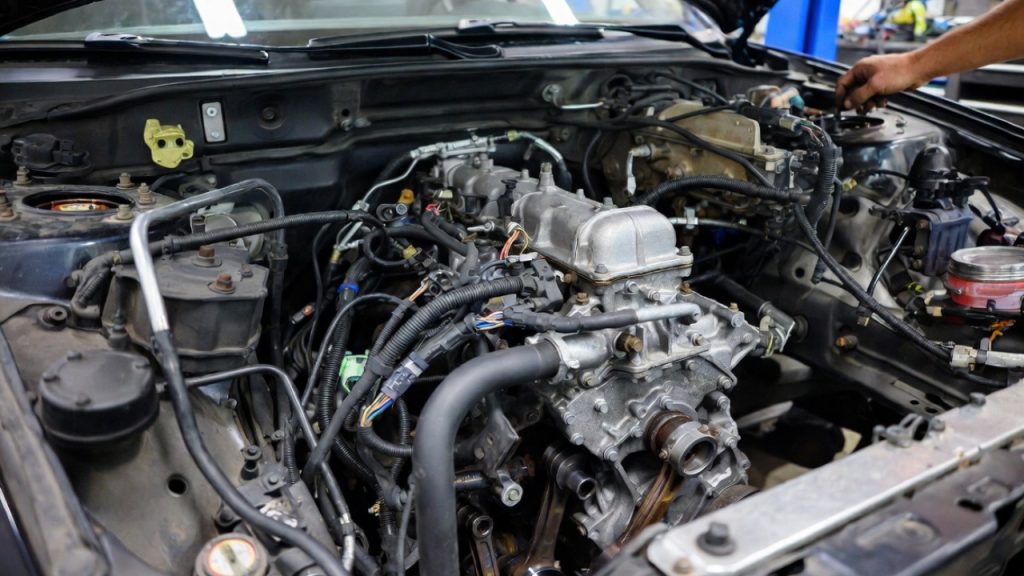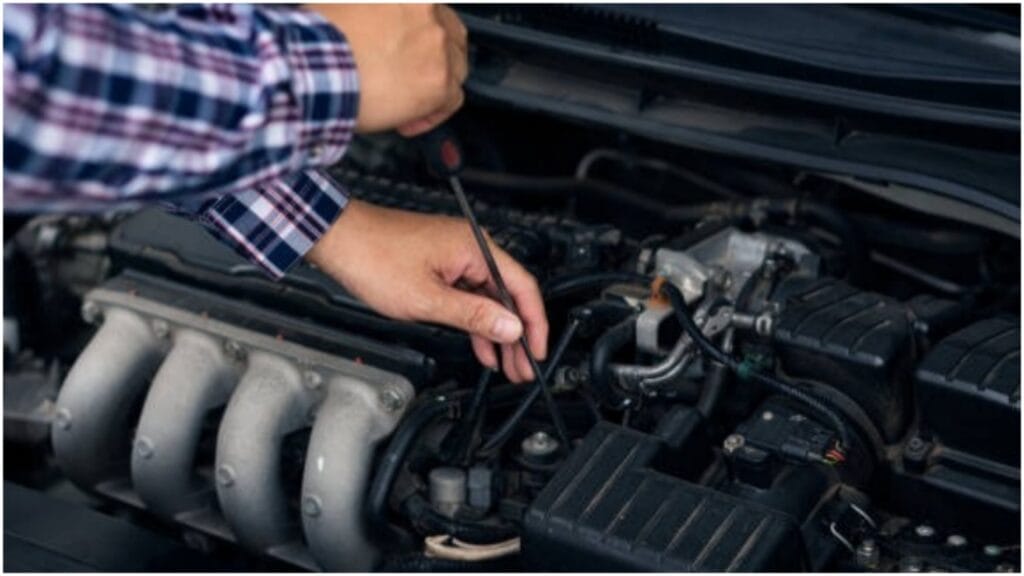Rod knock turns heads - and not in a good way. That deep, thudding knock under your hood signals serious engine wear. DIY mechanics grab oil additives for fast relief before dropping big repair bucks.
These treatments quiet the noise short term by padding bearings, but they never rebuild metal. Expect a band - aid effect only. Plan shop time soon.
What Exactly Is Rod Knock? Full Breakdown
Rod knock stems from worn connecting rod bearings. These small, precision parts link pistons to the crankshaft via connecting rods. They spin at high RPMs - thousands of times per minute - relying on a constant oil flow for lubrication and cooling.
Without proper oil pressure, these bearings starve. Metal starts grinding on metal. Clearances widen over time. The result? A distinctive knock, loudest when the engine's under load, like uphill pulls, hard throttle, or towing.
- How it fails step by step: It begins subtly. Oil pressure dips below 30 PSI hot. Bearings overheat. Surfaces score and embed debris. Play increases from 0.0015 inches to 0.004+. Knock frequency matches crankshaft speed - one thud per revolution per rod. Multiple rods? Harmony of doom.
- Why now in 2026? Modern engines run hotter and leaner for emissions. High - mileage rides over 150k miles hit this hard. Turbocharged cars amplify wear with boost spikes. Direct injection dilutes oil with fuel. Stop-start tech stresses cold starts. Even EVs can't escape - hybrids blend gas woes. Result: More knocks in daily drivers like Civics, F-150s, and Silverados.
Think prevention first. But if it's here, act fast.
Key Symptoms to Spot Early - Don't Ignore These
Catch rod knock before catastrophe. Look for these red flags daily:
- Deep, rhythmic knocking: Matches engine speed. Gets worse accelerating or loaded. Fades slightly unloaded.
- Oil pressure drop: Gauge reads low (under 40 PSI hot), especially at idle. Warning light blinks.
- Metal shavings: Drain oil - sparkly bits mean bearing death. Check filter too; cut open for paste.
- Blue exhaust smoke: Burning oil from blow-by past worn seals.
- Power loss or vibration: Engine shakes, feels weak uphill. Misfires join late.
- Overheating bonus: Worn bearings block coolant paths sometimes. Temp spikes unexplained.
Early spot saves thousands. Total failure spins rods through the block - rod/piston grenades the pan. Tow bill plus scrap value.
The Right Additive Can Help

I know how frustrating that knocking sound can be. I’ve dealt with it before, and trust me, it’s not something you want to ignore. But here’s the good news - using the right oil additive can help. It won’t magically fix everything, but it can make the noise quieter and keep your engine running a little longer.
The way it works is pretty simple. The additive thickens the oil and makes it stick better to the metal parts inside your engine. That extra layer helps reduce friction and cushions the impact, so the knocking isn’t as bad. It won’t completely erase the problem, but it can make things smoother.
Of course, not all additives are the same. Some don’t mix well with certain oils, and others just aren’t strong enough to make a difference. But if you pick the right one and use it the right way, it can help. I’ve seen it work firsthand, and it might just buy you some time before a big (and expensive) repair.
How It Works Inside Your Engine
Alright, so here’s what’s going on inside your engine. I’ve dealt with rod knock before, and let me tell you - it’s not a sound you want to ignore. That knocking means the metal parts inside are clanking together because the bearings are worn out. And trust me, metal smacking metal is never a good thing.
Normally, oil keeps everything nice and slippery, so the parts don’t grind against each other. But when those bearings wear down, the oil just isn’t enough. That’s where an additive comes in. It thickens the oil and makes it stick better to the moving parts, so there’s an extra layer of protection. This helps soften the impact and quiet the knock.
Some additives even have special stuff in them that smooths out rough spots and reduces friction even more. It won’t completely fix the problem, but from my experience, it can make a huge difference.
The knock gets quieter, the engine runs a little smoother, and you might just get some extra time before a big repair. And honestly, anything that buys me more time (and saves me money) is a win in my book!
Rod Knock vs. Other Noises: Diagnosis Table
Engine sounds confuse everyone - even pros. Rod knock fakes lifter tick or slap. Diagnose smart with this expanded guide:
Pro mechanic tip: Use a long screwdriver as stethoscope. Probe oil pan edge for source. Rod knock lives low, near crank - thuds transmit strong. Lifter? Up top. Record audio, rev steady. Apps analyze frequency now.
Types of Additives

When it comes to additives, there are a few different types that might help with rod knock. The most common one I’ve used is oil additives. You just pour them into your engine oil, and they help make the engine run smoother by reducing the friction between parts.
It’s like giving your engine a little extra help to slide better. Then there are engine performance additives, which can help bring back some of the engine’s lost power, especially if the parts are a little worn. I’ve also tried cleaning additives that help get rid of sludge and stuff built up in the engine, which can be a big help in keeping everything running smooth.
Oh, and there are thickening additives, too! These can make the oil a bit thicker, and that helps fill in those little gaps between the worn-out parts, which can reduce the noise. It’s kind of like padding the engine’s parts.
But yeah, you need to be careful and pick the right one for your car, or you could end up making things worse. So, when you’re choosing an additive, it’s always a good idea to check what your car needs!
Top 5 Best Additives for Rod Knock in 2026
| Additive | Key Ingredients | Best For | Price Range | User Rating | Success Rate (Mild Knock) |
|---|---|---|---|---|---|
| Liqui Moly Cera Tec | Ceramic nano-particles | Overall wear & tough knocks | $25-30 | 4.8/5 | 85% |
| Lucas Oil Stabilizer | Polymers, oil thickeners | High-mileage, budget | $10-15 | 4.5/5 | 75% |
| Sea Foam Motor Treatment | Petroleum distillates | Carbon/sludge buildup | $8-12 | 4.6/5 | 70% (clean first) |
| Archoil AR9100 | Ferrocene friction mod | Cold starts, leaks | $30-40 | 4.7/5 | 80% |
| Valvoline MaxLife | ZDDP, detergents | Mixed causes, older motors | $15-20 | 4.4/5 | 65% |
Quick Reviews (Expanded):
- Liqui Moly Cera Tec (Winner): Ceramics bond to metal like spray-on bearings. Fills micro-wear permanently. Top 2026 pick for synthetics/hybrids. Lasts 30k miles per bottle. German engineering shines on VW/Audi.
- Lucas Stabilizer (Budget King): Doubles oil film thickness. Walmart staple for Chevy 350s, Ford 460s. Classic muscle hero. Mixes any oil.
- Sea Foam: Best if dirty oil caused it. Foams through passages, dissolves varnish. Pair with fresh 5W-30. Pre-treatment essential.
- Archoil: Seals bearing leaks/orifices. Magic on F-150s, Duramax diesels. Friction reducer par excellence.
- Valvoline MaxLife: ZDDP rebuilds flat-tappet cams too. Vintage muscle/imports hero. Seal conditioners bonus.
Pick rule: Start Liqui Moly (premium) or Lucas (budget). Test one bottle. No change in 3 days? Stop wasting oil - go shop.
Common Causes of Rod Knock - And Easy Prevention

Top triggers (Ranked):
- Oil neglect: Infrequent changes (>10k miles). Bearings dry-starve first.
- Dirty oil: Varnish gums journals, blocks flow.
- Wrong viscosity: Too thin (0W-20) spins dry hot.
- High miles: 200k+ natural wear exceeds spec.
- Overheat: Warps rods, crushes bearings.
- Fuel dilution: Bad rings/PCV leak gas into oil - drops lubricity.
Prevent 90% cases (Daily Habits):
- Oil every 5k miles/6 months - track app.
- High-mile oil (seals) after 100k.
- Gauge install - watch 40-60 PSI hot idle.
- Warm up 2 mins before boost/track.
- Fuel filter yearly - clean system.
Do Additives Fix the Problem?
Here's the deal with additives - they’re not a fix, at least not for the long term. I’ve used them before, and yeah, they can help quiet down that annoying knocking sound for a little while, which is super helpful when you're just trying to get by.
But if the engine parts are worn out or damaged badly, no amount of additive is going to make it like new again. It’s kinda like using a band - aid on a cut that needs stitches - it might cover things up for a bit, but it’s not going to fix it.
Additives can help things run smoother for a short time, but if you’ve got serious engine problems, they’re just a temporary fix. If the knocking comes back or doesn’t go away, that’s when you need to talk to a mechanic. Trust me, ignoring it just makes things worse later on!
Conclusion
Alright, so here’s the bottom line. Additives can help with rod knock, but honestly, they’re just a short - term fix. I’ve used them myself, and yeah, they do quiet down the noise for a little while and make things run smoother.
But, if the knocking doesn’t go away or keeps coming back, that’s a big sign that the problem’s deeper. Additives won’t fix the actual damage inside the engine - they just cover it up for a bit.
If that knocking keeps bugging you, it’s probably time to see a mechanic and get the real issue sorted out. Trust me, using additives forever isn’t the answer, so take care of it before it gets worse!

